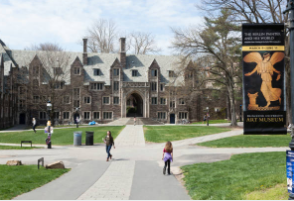Princeton University, located in Princeton, New Jersey, is one of the most prestigious Ivy League institutions in the United States. Known for its rigorous academics, beautiful campus, and notable alumni, Princeton attracts a highly competitive pool of applicants each year. To gain admission to Princeton, prospective students must meet a variety of academic and extracurricular requirements, as well as demonstrate unique personal qualities and achievements.
Academic Requirements
High School Transcript
Princeton places a significant emphasis on a student’s high school academic record. Applicants are expected to have taken a challenging curriculum, including advanced placement (AP) or International Baccalaureate (IB) courses if available. The university looks for excellence across a range of subjects, with particular attention to performance in courses related to the student’s intended field of study.
Standardized Tests
For the 2023-2024 application cycle, Princeton has adopted a test-optional policy due to the ongoing effects of the COVID-19 pandemic. However, students who choose to submit SAT or ACT scores will have their results considered. Competitive applicants typically score between 1460-1570 on the SAT and 33-35 on the ACT. Princeton also recommends, but does not require, two SAT Subject Tests.
Letters of Recommendation
Princeton requires two teacher recommendations and one counselor recommendation. These letters should come from teachers who have taught the student in core academic subjects such as mathematics, science, social studies, or language arts. Strong recommendations provide insight into the student’s intellectual curiosity, classroom engagement, and personal character.
Application Components
Common Application or Coalition Application
Applicants must submit either the Common Application or the Coalition Application, along with Princeton’s supplemental application. Both platforms require students to provide general information, a personal essay, and details about extracurricular activities and honors.
Princeton Supplement
The Princeton supplement includes several short-answer questions and a longer essay. These prompts give applicants the opportunity to showcase their interests, experiences, and reasons for wanting to attend Princeton. The supplement is a critical part of the application, allowing the admissions committee to understand the applicant’s unique perspective and fit with Princeton’s community.
Graded Written Paper
Princeton requires a graded written paper from an English or history class. This paper should include the teacher’s comments and provide evidence of the applicant’s writing and analytical skills. The requirement underscores Princeton’s commitment to academic excellence and intellectual rigor.
Extracurricular Activities
Leadership and Impact
Princeton values students who have demonstrated leadership and made significant contributions to their school or community. Applicants are encouraged to highlight activities where they have shown initiative, commitment, and the ability to make a positive impact.
Depth Over Breadth
While involvement in numerous activities can be impressive, Princeton prefers to see sustained and meaningful engagement in a few areas. This depth of commitment shows passion and the ability to develop expertise and leadership skills over time.
Personal Qualities
Character and Values
Princeton seeks students who embody the university’s core values of integrity, respect, and service. Personal essays, recommendation letters, and interviews provide opportunities for applicants to demonstrate these qualities.
Unique Perspectives
Diversity of thought and experience enriches the Princeton community. The admissions committee looks for students who can bring unique perspectives and contribute to a dynamic and inclusive campus environment.
Financial Aid
Need-Blind Admission
Princeton practices need-blind admission, meaning that the ability to pay for tuition does not influence the admissions decision. This policy ensures that all qualified students, regardless of their financial background, have an equal opportunity to attend.
Generous Financial Aid Program
Princeton’s financial aid program is among the most generous in the country. The university meets 100% of demonstrated financial need without requiring students to take out loans. Financial aid packages include grants that do not need to be repaid, making a Princeton education accessible to students from all economic backgrounds.
Application Process
Deadlines
- Single-Choice Early Action: The deadline is November 1. This non-binding option allows applicants to receive an early admissions decision while retaining the ability to apply to other institutions.
- Regular Decision: The deadline is January 1. Decisions are typically released in late March or early April.
Interviews
While interviews are not required, Princeton offers alumni interviews to most applicants. These interviews provide an additional opportunity to learn about the university and for the admissions committee to learn more about the applicant.
Conclusion
Gaining admission to Princeton University is highly competitive, requiring a combination of exceptional academic performance, meaningful extracurricular involvement, and strong personal qualities. Princeton’s holistic review process ensures that each applicant is considered in the context of their individual experiences and potential to contribute to the university community. With its need-blind admission policy and generous financial aid program, Princeton remains accessible to talented students from all backgrounds, continuing its tradition of excellence and inclusivity.
Princeton’s admissions process is designed to identify students who not only excel academically but also have the potential to thrive and contribute to the university’s vibrant community. Prospective students should focus on presenting a well-rounded application that highlights their achievements, character, and unique perspectives.
